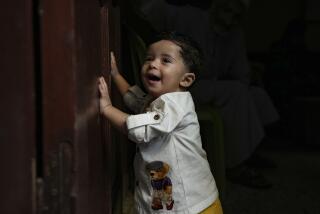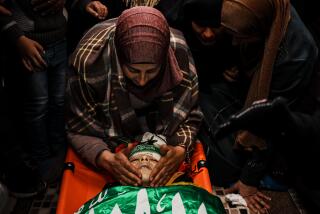Afghan Boy Sustained by Dream of Revenge Against the Taliban
SALANG, Afghanistan — Turn out the pockets of a 14-year-old Afghan boy named Alauddin, and you will find the two things he needs to survive: flatbread and bullets.
If that was not testament enough to the gulf between his world and the West, Alauddin’s story of survival seems plucked from another century. His experiences make it clear why he delights in the U.S. bombing of Taliban territory.
“It’s good that the Americans are killing Talibs, but I don’t want them to kill them all,” he said, his eyes shining. “I want them to leave one for me to kill. No, not one. Two.”
After his father was killed fighting the Taliban, the extremist Islamic movement that controls most of Afghanistan, Alauddin, then 13, crossed his war-torn country on a lonely exodus to safety.
But the place where he has found refuge is by no means safe--a front-line unit of anti-Taliban moujahedeen fighters that has adopted him as a little brother, teaching him the art of war.
After 22 years of fighting, Afghanistan is a country of fatherless children and people far from home. Attached to many moujahedeen brigades is a collection of lost boys, many thirsting to avenge their fallen fathers and brothers.
Alauddin’s father died in the Samangan region, in northern Afghanistan, more than a year ago, and the Taliban immediately took over his village, Saresang.
Alauddin saw the Taliban rounding up men between 15 and 55, and beating some with pieces of steel cable. They searched for people who had defended the settlement, demanding that the villagers give them up.
“Life became very frightening for us because the Taliban wanted to arrest all the young men. That’s why my mother told me to leave,” Alauddin said. His mother told him to head toward opposition-held territory and to avenge his father’s death. “She hugged me and kissed me goodbye. She said, ‘You are our last hope,’ and she was crying.”
He hasn’t spoken to her since.
What followed is reminiscent of Dickens, had the writer ever visited this volatile country filled with toiling, ragged children.
There are the barrow boys in the bazaars, sitting in their wheelbarrows waiting for customers, or pushing enormous, unwieldy loads. There are the boys of 11 and 12 in the tailors’ shops, working with their Chinese sewing machines for no pay except tips, saving for years to buy their own machines. There are the shoeshine boys with their little wooden boxes, trawling the teahouses for customers. There are the beggar girls pulling at the sleeves of strangers.
Traveling on his own through hostile territory, in a circuitous but somewhat safer route, Alauddin attached himself to different groups of people like a puppy hoping to be taken home.
He fled south through Taliban territory in a vehicle with 20 people, mainly women and children, all strangers. He ate only the loaves of flat brown bread that his mother had wrapped for him.
It took three days, passing through many Taliban checkpoints, to get to the capital, Kabul, his first time in the city.
There he found amazing scenes: turbaned Taliban police rounding up young men who were working in shops and marching them off to the mosque to pray, measuring the length of trousers women wear under their compulsory, shroud-like burkas, or chasing women seen walking alone in the streets and beating them with sticks or lengths of steel cable.
“It was funny to see how they measured the length of women’s pants, especially those who didn’t wear socks,” he said. “But it was scary. It was very frightening to be alone.”
Alauddin knew not a soul in the city and gravitated to a teahouse near the bus station. The owner, Amershah, let him sleep there for 10 days in return for helping with odd jobs.
The boy was desperate to leave Taliban-held territory. His plan was to get to the northern area controlled by the opposition. But authorities were preventing men and boys from leaving the city.
He joined a group of women and children, huddling in a truck headed north. Finally, they reached the last Taliban-held village before the front line--he never found out its name. After several hours walking through the mountains, he got to opposition-held turf, and felt a surge of happiness and relief.
But he didn’t know anyone and had nowhere to go. And after a journey of two weeks, the grief and anger over his father’s death were taking a fresh hold. Again, he gravitated to the local tearoom, looking for friendship or luck.
Jon Agha, 45, a colonel and moujahedeen fighter in the Salang Gorge with five children of his own, happened to be in there that evening.
“The owner of the cafe told me there’s a boy from Samangan in the teahouse,” he recalled. “He told me the boy was sad and angry because his father was killed. He said: ‘Take him into your family. Let him work for you.’
“So I took him with me and brought him back to the base. When I go to fight, he goes with me. He didn’t want to be left behind. It was boring for him.”
Alauddin has been in the brigade for a year. Unused to attention, he haltingly tells his life story.
And despite his bashful smile and gawky manner, there is something dangerous in his eyes. He is angry and he wants vengeance.
So far, his main task is to carry water, fuel and ammunition to the fighters, who have taught him to fire a Kalashnikov rifle, a grenade launcher and even a tank cannon.
He is desperate to fight. But Jon Agha won’t let him.
“He’s ready to fight. But I don’t let him take part in any fighting, because he’s too small. He’s like a younger brother or a son to me,” Jon Agha said. “And I hope by the time I do allow him, the war will be over.
“But he wants to fight. He suffered. He wants to be avenged.”
All the boy’s rage and hatred erupted this past summer when fighting broke out in the Salang Gorge, about 60 miles north of Kabul. Jon Agha told Alauddin to stay behind. The boy begged and wept, but it did no good.
“Then I saw him running way up ahead of all of us. He just took a gun and ran ahead. I called him and caught up with him and shouted at him and sent him back to the base,” Jon Agha said. “He cried and cried.”
Alauddin was so humiliated and angry that he ate nothing for two days.
Jon Agha says the minimum fighting age in his unit is 18, though it is much lower in others.
The boy’s hopes and dreams are focused entirely on war. It is the only chance he will have to avenge his father’s death.
He is waiting desperately for opposition fighters to take advantage of U.S. bombing and launch a big offensive, giving him the chance to kill people like the ones who killed his father.
Alauddin grabbed a flat loaf of warm bread, rolled it and stuffed it in his vest pocket on top of the bullets. He would eat it later, cold. He looks forward also to a cold, savage vengeance.
“When I avenge my father’s death, then I will go home and see my mother,” he said, dreamily.
*
Sergei L. Loiko of The Times’ Moscow Bureau contributed to this report. Dixon and Loiko reported from Afghanistan.
More to Read
Sign up for Essential California
The most important California stories and recommendations in your inbox every morning.
You may occasionally receive promotional content from the Los Angeles Times.










